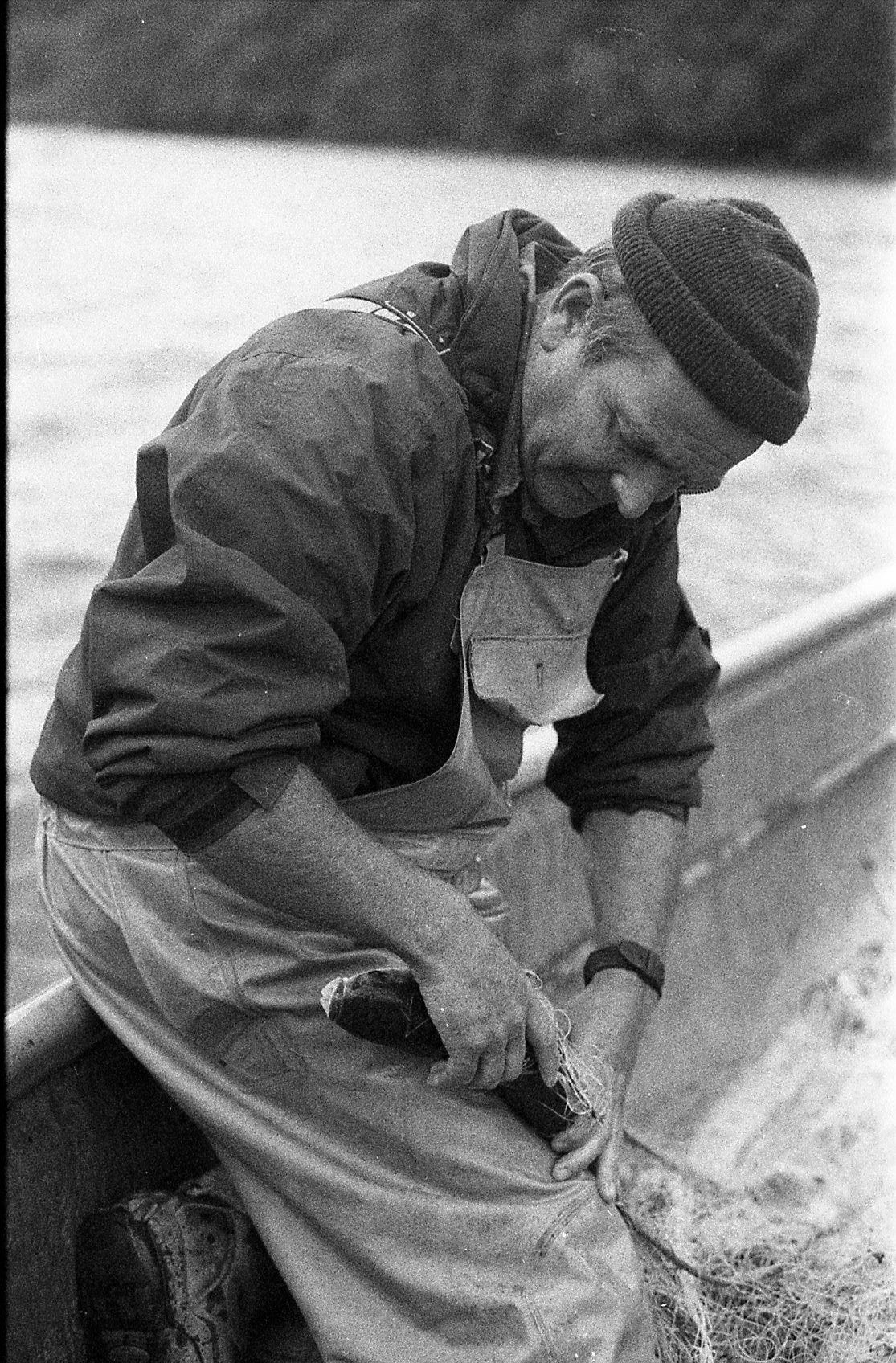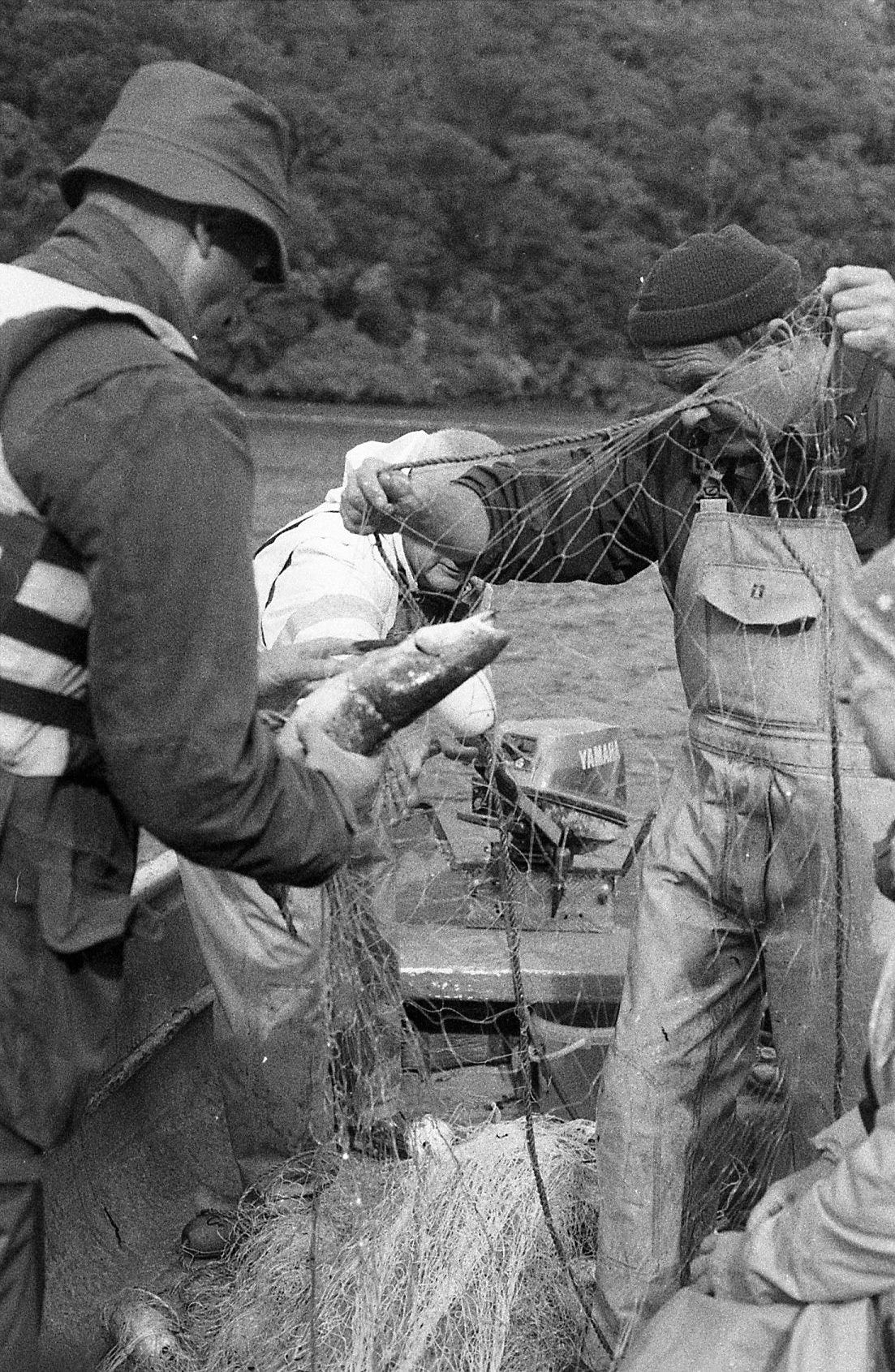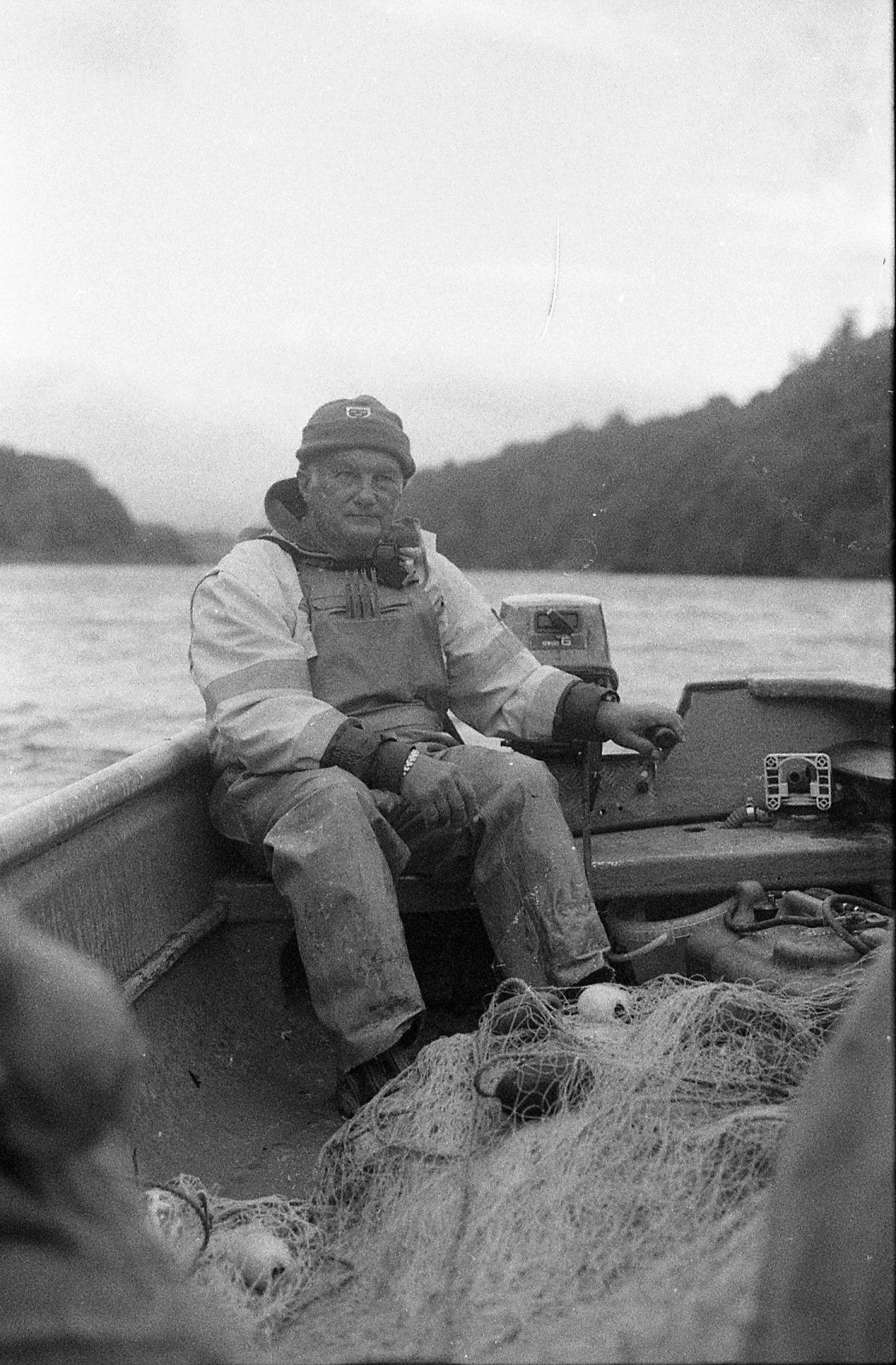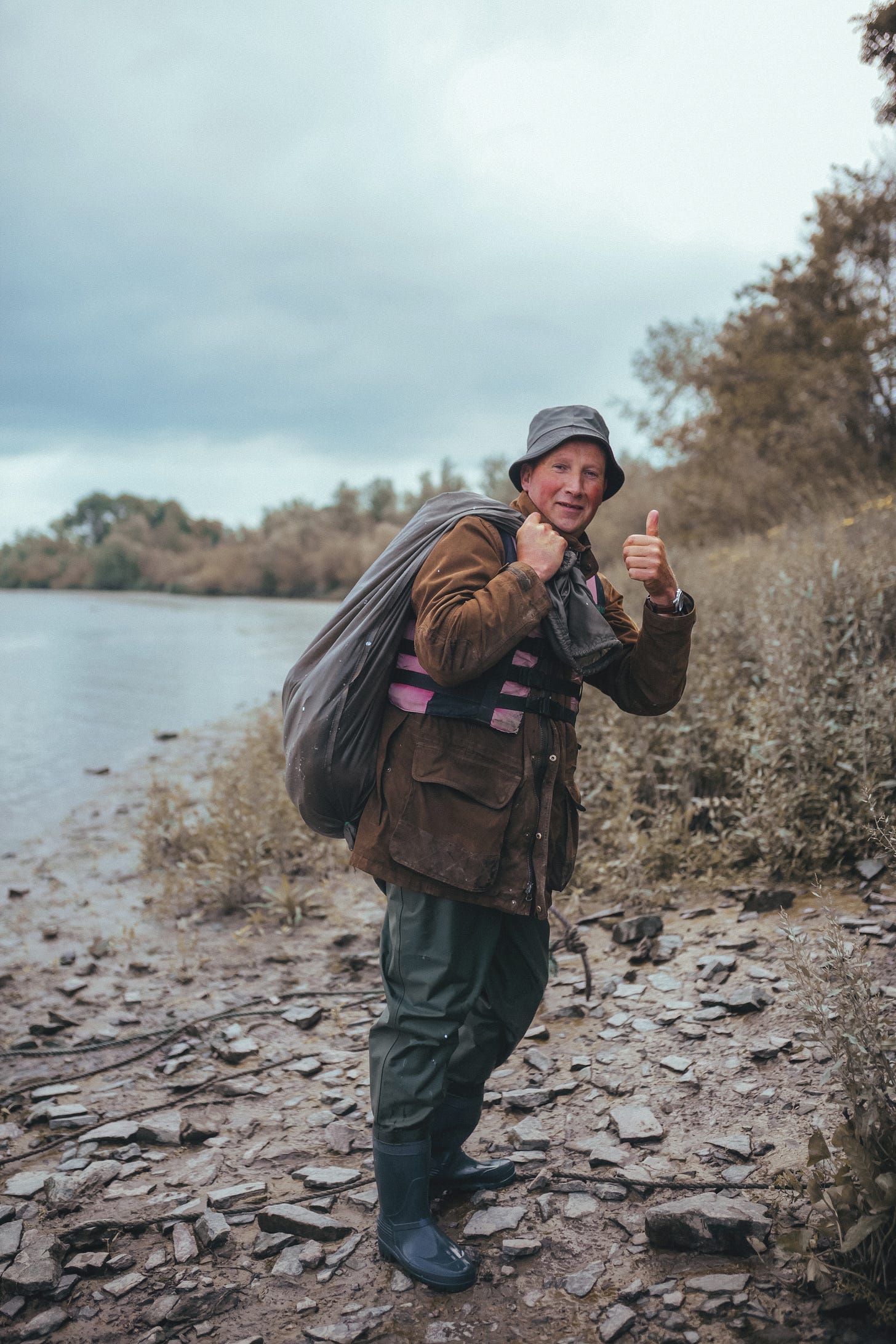WHERE HAVE YOU BEEN, WHAT HAVE YOU SEEN? // Smoked Irish Wild Atlantic Salmon PART TWO
A story of I when I went draft net fishing for wild Atlantic Salmon with the fishers of the munster Blackwater and smoked the catch on a hill in West Cork.
I remember the first time I went to kill the wild Atlantic salmon on the Munster Blackwater. It was after a time Mikey and Eamon arrived at the smokery one evening with their van full of salmon, unloading each fish with the proud chatter and buzz that had carried over from their success on the water the previous tide. Pressure was on for them to catch enough fish to fill their tiny quota, as if they didn’t meet the required number, they were being faced with a moratorium on the Blackwater, which would see the end of fishing for salmon as food for the first time in 9000 years. I followed them back for the two hour journey to Youghal harbour, keen to document the techniques of this imperilled practice.
Mikey, in his late 40s, had been fishing salmon since he was a boy with his uncle Mickey, now approaching 80. And Eamon, Eamon Uniacke, fishing year upon year in the shadow of Mount Uniacke.
Their knowledge of the water is staggering, unwittingly biologists, farmers, technicians, conservationists and craftspeople, with the steadfast knowledge that comes from being in and of a place.
To work a 3am tide, through a huge deciduous forest we drove to an old stone-wall lay-by above the river around 4 miles from the harbour in the dark of a completely moonless night. By the headlights of the van, we donned yellow oilskins and boots, not a word spoken between us. Using a secret stairwell of obliquely placed stones that emerged from the wall on the side of the river, we felt our way down to the muddy river bank called the slob. I flicked on my head-torch only to have it immediately pulled off my head-
“No lights! Never lights! We wait”
With no moon, and even leaving time for our eyes to adjust, I convinced myself it was impossible to see and for a time it was. Only when Mikey began to squelch in the direction of the water could I begin to make out the faintest of lines with strained eyes. I sensed something was up, by a strange electric energy between the three fishers. None of them spoke a word. Just looking out at the water, with an occasional low grunt, they each felt what was happening, the silent river, the sound of the trees.
“Tis the night for it. Can you feel that boy? It’s perfect, it’s perfect tonight”
I couldn’t, but I definitely, definitely could feel them feeling it.
As we boarded the 19ft wooden punt, Mickey handed one end of the draft net to Eamon, who’s job it was to stay ashore and walk the slob, and Mikey took us silently by oar out to the far side of the Blackwater 150 metres across, Mickey slowly shooting the net once he spotted the tips of two particular trees line up with an old wooden post. The lead line sinks to the bottom and bobbing corks float the top of the net. Between them, it is held with perfect tension, with Mikey treading water and Eamon waiting. After half an hour in total silence, the boat and Eamon move exquisitely gently downriver as the tide begins to move up, and the with it, the salmon.
“I’d say they’re coming”, Mickey tells to the night.
Time passes.
“We’ve got one”, he shouts with a whisper. “She’s good, she’s 14 pounds”
Looking out at the row of corks, I can’t see them move at all. Mickey hands me the end of the net, and I can just make out the faintest tremor in its tension. Mickey guides the boat back to Eamon as Mikey hauls the net, pulling the salmon onto the boat. I remember seeing it there, fallen onto the deck, not fighting, opening and closing its mouth. For some reason I reached out and lay my hand on it, where I thought its heart might be, and watched it fade away. I had handled so many lifeless salmon in the filleting room with Sally, and this was a profound experience for me, confusing and emotional. Mikey turned round still hauling the net, heavy with weed, pulling each fish from the net with his hands, and seeing me holding the salmon shouts with an excited grin in honest wonder like a young feller, a glint in his eye;
“Where have you been?! What have you seen!?”
That night, over 4 hours and two passes, we killed eleven fish. The lads were overjoyed, and before leaving, I asked Mickey the old boy about his best catch, back in the day.
“That would be in 1965, I killed one hundred fish in one tide. I was nearly destroyed, but they remembered that one in the pubs for many years”. Picturing him back then, in his prime, and the effort it takes to haul fish, each one touched by his hands, I’m sure they did. It strikes me that the limit to what we take from nature should be dictated by what we can harvest with our own two hands at any one time, made apparent to me by the men of the Blackwater and Sally on the hill. He turned to me with a kind of defeat in his cataract-clouded blue eyes which began to well a little with tears, holding my gaze for a while. He cleared his throat and said to me,
“It’s different now. We’ve become too efficient."
I remember when I was a boy, I liked to look up at the intercontinental flights way up there in the sky with their jet-stream and pretend I was at the bottom of the Atlantic looking up at an ocean liner and its wake. If you can take a second to picture that, try it now, the scale of water is overwhelming.
Try it now.
Now, I do it to realise the enormity of the Salmon’s journey, as it uses its lateral line which runs down each flank of the fish, full of iron, that brown meat I had eaten back in London, with which it navigates the earth’s magnetic fields to travel back to the Blackwater where it was born, if it can evade being killed at sea by marine predators, hyper-efficient industrial fishing boats or the inland human inhabitants of Irish rivers. And how its red colour, from the natural world’s most powerful anti-oxidant found in the krill they eat off Greenland in the arctic circle has been made available to us for centuries by this astonishing journey, as they return to their native waters to feed us, if we can outwit them with mind and body, in an eternal cycle that will roll long after we’re gone.
Where have you been, what have you seen?
I understand Mikey’s primal reaction to the mystery and life of this most magnificent creature.

I will always remember that piece of salmon on the shelves in London from years ago, and how it led me to learn that all life feeds on life, something which I ask myself every day whenever I eat anything. What do we want to become part of us? Everything has lived and has been on a journey, and if we think of this idea every day, we might just be able to find truth again, respecting and reconnecting with a balanced world that once was, and dwell happily therein.
Keep reading with a 7-day free trial
Subscribe to Up There The Last to keep reading this post and get 7 days of free access to the full post archives.








